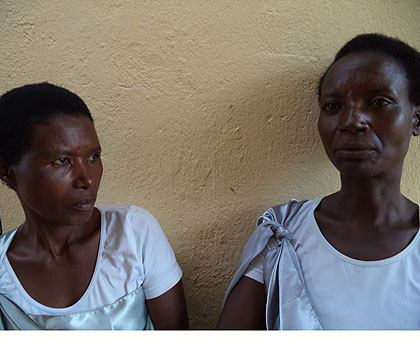For Noella Musabyemariya, a 44-year-old Genocide survivor living in Kagabo sector of Nyamasheke District, Western Province, April 11, 1994 is a day she will live to remember.


For Noella Musabyemariya, a 44-year-old Genocide survivor living in Kagabo sector of Nyamasheke District, Western Province, April 11, 1994 is a day she will live to remember.
It is the day her husband was murdered in cold blood by the Interahamwe militia just days after killings erupted in her home village.
At the time, the couple had been married for barely four years and had only one child. Musabyemariya was also pregnant.
"We were living happily and always thanked God for his providence,” Musabyemariya says with nostalgia.
It was after the death of former president Juvenal Habyarimana, on April 6, 1994 that tensions started to build up in the now Kagano sector.
At the time, the family was mourning the death of a relative who had died following a long illness. All of a sudden, news of Habyarimana’s death filtered in and spread like bushfire, Musabyemariya recalls.
"People started gathering in small groups and you could smell something bad was going to happen,” Musabyemariya says.
The days that followed saw the country descending into 100 days of darkness and unimaginable manslaughter and Kagano was not spared.
Musabyemariya’s family had no other option but to flee with hope that they might escape the machete-wielding militia.
However, on the fateful day, her husband was caught by the militia and brutally killed.
"He was killed on a Monday at around 1pm. I will never forget that day,” Musabyemariya says as she struggles to hold back tears.
She says she lived in hiding, moving from one place to another until the end of the Genocide.
"God always creates a way where there seems to be no way. I did not make any special effort to survive nor did I have any particular trick to evade killers. Only God helped me survive,” the widow says.
Facing consequences
After the Genocide, life turned into a nightmare for Musabyemariya and her two kids, including the one she was pregnant of at the time her husband was slain. They sunk into extreme poverty and hope seemed to be a mirage.
"We had nowhere to live, no food to eat, and no clothes to wear,” Musabyemariya says.
Due to the difficulties she was facing, Musabyemariya sunk into depression.
From over 70 kilogrammes she weighed in April 1994, she descended to less than 45 in just one month.
However, time has healed Musabyemariya’s wounds. With support from the government and her community, Musabyemariya managed to get a house and other assistance to transform her life.
"I now live a different life, a positive life. I do live better,” she said when I asked what she has achieved following the end of the Genocide.
With a smile on her face, Musabyemariya added: "I have hope for the future and this in itself is an achievement. With hope, I can work and transform my life. In the past, I couldn’t because the future was uncertain.”
Besides owning a house, Musabyemariya also has a cow and a number of other livestock.
"I grow a variety of crops and with use of manure from my cow’s dung, the yields have increased,” she says.
Musabyemariya says she now has the capacity to feed her children and meet their basic needs.
"I see light at the end of the tunnel. I can see where I am heading,” Musabyemariya adds.
Musabyemariya is just one among many survivors who had lost hope after the horrors they went through during the 1994 Genocide against the Tutsi.
Emma Marie Mukambaraga, 53, a resident of Mariba cell in Nyabitekeri sector, Nyamasheke District, remembers with sadness how she and her family were rounded up by the Interahamwe militia when killings erupted.
The killers later killed her husband together with their first born. Mukambaraga on her part survived miraculously.
As killings intensified, she fled to the neighbouring Democratic Republic of Congo where she lived until the Rwanda Patriotic Front (RPF) defeated the genocidal regime and ended the bloodshed.
"When we returned, there was nowhere to start from to build a new life,” she recalls.
The months after the Genocide were the hardest for Mukambaraga and two of her children who had survived. Because they had no shelter, they spent the first months wandering from place to place and spending nights with relatives and friends.
"People soon got tired of us. We had become a burden to them,” she says.
With support from the Fund for Genocide Survivors (FARG), Mukambaraga got a house and she has managed to start a new life.
"We have fought hard to rebuild our lives and our efforts have paid off. The difficult part was to accept what had happened and put it behind to start a new life. Once we overcame that obstacle, we experienced positive growth in our lives,” Mukambaraga said.
She says she has managed to build another house for her family because the one she got had started getting dilapidated. She also keeps some livestock to supplement her income.
Confronting challenges
The survivors say that despite the achievements registered over the past 20 years, they still face a number of difficulties.
Marianna Uzamukunda, from Kanjongo sector, says lack of enough capital to invest in income generating activities still hampers their efforts.
She calls for continued support to survivors, saying: "Though we continue to register many achievements, we are yet to reach where we want to be.”
She also says some survivors are yet to know the whereabouts of their relatives, something she says has traumatic consequences on their lives.


